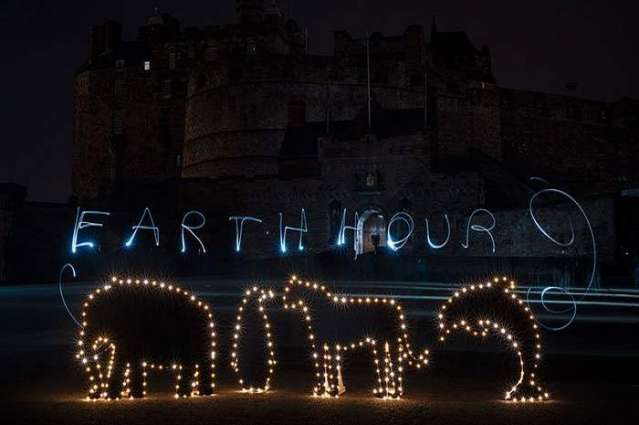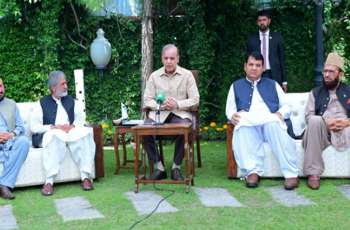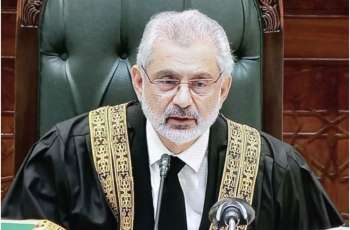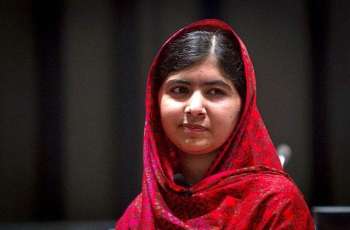On Saturday 8:30pm local time, WWF-Pakistan joined more than 170 nations around the world to celebrate Earth Hour, the global movement united by millions of people worldwide to show their commitment to protect the planet
Islamabad (Pakistan Point News - 30th March, 2019) On Saturday 8:30pm local time, WWF-Pakistan joined more than 170 nations around the world to celebrate Earth Hour, the global movement united by millions of people worldwide to show their commitment to protect the planet. Landmarks across the country switched off their lights in solidarity for the planet and joined WWF-Pakistan’s call to combat climate change. As nature declines like never before, coupled with the ever-present challenge of climate change, Earth Hour 2019 focused on raising awareness on why nature matters and inspiring global action on conserving nature.
From the Eiffel Tower to the Sydney Opera House, and the Empire State Building to Burj Khalifa, thousands of international landmarks switched off their lights in solidarity for the planet, to raise awareness about the importance of nature, and encouraged individuals, businesses and governments worldwide to be a part of the solutions needed to build a healthy, sustainable future – and planet – for all. In Islamabad, the event was celebrated in front of the National Assembly.
Officials of government department, researchers, and corporate partners were part of the event. Some of the guests included Ali Nawaz Awan, Special Assistant to PM on CDA Affairs; Seemi Ezdi, Member, Senate of Pakistan; Syma Nadeem, Parliamentary Secretary, Ministry of Inter-Provincial Coordination; Dr Anees Ur Rehman, Chairman, Islamabad Wildlife Management Board; Irfan Tariq, Director General Environment, Ministry of Climate Change; and Zeeshan Ali Naqvi; Deputy Major, Islamabad.
On the occasion Muhammad Sadiq Sanjrani, Chairman, Senate of Pakistan shared a message for the people of Pakistan. He said that the recently constituted Caucus on Climate Change in addition to the Standing Committee on Climate Change is testament to Parliament’s commitment to effectively tackling the issue in Pakistan. ‘Pakistan is among the top ten countries affected by climate change and this environmental challenge is already impacting our economy severely.
It is of utmost importance we bringing the planet back to its normal ecological systems by taking measures for it and shunning activities against it.’ Speaking on the occasion Rab Nawaz, Senior Director Programmes, WWF-Pakistan said, ‘Pakistan is among the top ten countries affected by climate change and this environmental challenge is already impacting our economy severely. On this Earth Hour, by joining WWF, millions of people around the world have shown their commitment for the planet.
Switching off all unnecessary lights for one hour on Saturday, 30 March is a symbolic gesture. All of us should pledge to take action in our capacity as an individual, business and policy and decision-maker to reduce our footprint, save nature and protect the environment. ‘ Other major landmarks across the country also participated in Earth Hour by switching off lights. These included DCO Offices; Avari and PC Hotels; Wazir Khan Mosque; Hazori Bagh; Trail Dehli Gate; Parks and Horticulture Authority (PHA) Lahore; MCB House; Parliament House; Supreme Court of Pakistan; Pakistan National Monument; Damn-e-Koh; Pak-China Friendship Centre; Shah Faisal Mosque; Convention Centre; D-Chowk; Lake View Park; 7th and 8th Avenues; Sindh Assembly and Frère Hall.
Earth Hour events were also celebrated at Provincial Assembly of Sindh in Karachi, WAPDA House in Lahore, and in various other WWF-Pakistan offices including Bahawalpur, Khanewal, Faisalabad, Peshawar, Nathiagali, and Sukkur where students, families and corporate members participated. The year 2019 marks the twelfth anniversary of Earth Hour globally, which started as a symbolic event in Sydney in 2007. The one-hour event continues to remain the key driver of the movement encouraging individuals, communities, households and businesses to turn off non-essential lights as a symbol for their commitment to the planet.




